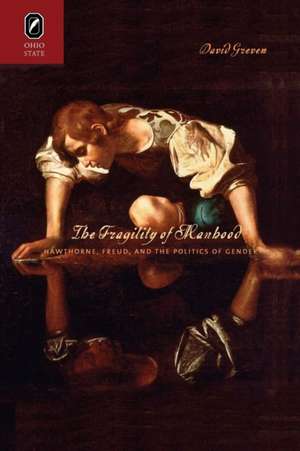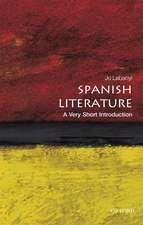The Fragility of Manhood: Hawthorne, Freud, and the Politics of Gender
Autor David Grevenen Limba Engleză Paperback – iun 2016
Merging psychoanalytic and queer theory perspectives, The Fragility of Manhood: Hawthorne, Freud, and the Politics of Gender reframes Nathaniel Hawthorne’s work as a critique of the normative construction of American male identity. Revising Freudian and Lacanian literary theory and establishing the concepts of narcissism and the gaze as central, David Greven argues that Hawthorne represents normative masculinity as fundamentally dependent on the image. In ways that provocatively intersect with psychoanalytic theory, Hawthorne depicts subjectivity as identification with an illusory and deceptive image of wholeness and unity. As Hawthorne limns it, male narcissism both defines and decenters male heterosexual authority. Moreover, in Greven’s view, Hawthorne critiques hegemonic manhood’s recourse to domination as a symptom of the traumatic instabilities at the core of traditional models of male identity. Hawthorne’s representation of masculinity as psychically fragile has powerful implications for his depictions of female and queer subjectivity in works such as the tales “Rappaccini’s Daughter” and “The Gentle Boy,” the novel The Blithedale Romance, and Hawthorne’s critically neglected late, unfinished writings, such as Septimius Felton. Rereading Freud from a queer theory perspective, Greven reframes Freudian theory as a radical critique of traditional models of gender subjectivity that has fascinating overlaps with Hawthorne’s work. In the chapter “Visual Identity,” Greven also discusses the agonistic relationship between Hawthorne and Herman Melville and the intersection of queer themes, Hellenism, and classical art in their travel writings, The Marble Faun, and Billy Budd.
Preț: 350.55 lei
Nou
Puncte Express: 526
Preț estimativ în valută:
67.08€ • 70.22$ • 55.50£
67.08€ • 70.22$ • 55.50£
Carte tipărită la comandă
Livrare economică 02-08 aprilie
Preluare comenzi: 021 569.72.76
Specificații
ISBN-13: 9780814252888
ISBN-10: 0814252885
Pagini: 320
Dimensiuni: 152 x 229 x 23 mm
Greutate: 0.45 kg
Ediția:1
Editura: Ohio State University Press
Colecția Ohio State University Press
ISBN-10: 0814252885
Pagini: 320
Dimensiuni: 152 x 229 x 23 mm
Greutate: 0.45 kg
Ediția:1
Editura: Ohio State University Press
Colecția Ohio State University Press
Recenzii
“In retooling psychoanalysis both in the light of and as a way to explore gender, sexuality, and visuality in Hawthorne’s fiction, David Greven challenges the primacy of the Oedipus complex as the psychoanalytic paradigm of choice and focuses more heavily on Freudian narcissistic theory. In so doing, he offers venturesome, provocative analysis that sheds light on issues that are currently at the forefront of literary and cultural studies.” —Robert Abrams, professor of English, University of Washington
“David Greven reinterprets both Hawthorne’s and Freud’s perspectives on masculinity by considering their shared concerns over the destabilizing effects of a narcissism that each saw as both foundational yet threatening to the formation and social operation of masculine identity. His analysis complicates conventional understandings of gender norms in the period, and of the intersections of masculinity, desire, and power, while offering new perspectives on Hawthorne.” —James Salazar, associate professor of English, Temple University
"When Greven focuses on the representations and historical and literary contexts of Hawthorne’s fictions, he reveals patterns of fascinating instability in Hawthorne’s representations of gender identity and relations. ... One of the most valuable contributions that this volume makes is the final chapter on the unfinished novel Septimus Felton(later Septimus Norton)... insightful and original analyses."
—Beverly Haviland, Psychoanalysis, Culture & Society
—Beverly Haviland, Psychoanalysis, Culture & Society
In this psychoanalytical study, Greven (Univ. of South Carolina) argues that the Freudian Narcissus myth lies unmentioned behind many of Nathaniel Hawthorne's novels and stories,,,Examining Frederick Crews's interpretation based on the Oedipal myth (in his The Sins of the Fathers), Greven concludes that Narcissus is more central...The strength of Greven's study comes from his grounding in the field of gender politics. Summing Up: Recommended.--CHOICE
"...instructive and enlightening ... Greven's readings frequently cast Hawthornean texts in unfamiliar light. I especially like his inter-textual analyses... The Fragility of Manhood provides a provocative and controversial take on the psychoanalytic dimensions of narcissism as it informs Hawthorne's oeuvre."--John Dolis, The Nathaniel Hawthorne Review
“David Greven embarks on the ambitious project of deploying Freudian psychoanalytic constructs of narcissism, along with the Lacanian theory of the gaze to argue that Hawthorne’s work mounted a critique of normative gender roles...Greven argues persuasively as to the rightness of his position as well as justifying psychoanalytic theory as a tool for literary criticism, adeptly addressing potential concerns with his conclusions and his method. Greven carefully contextualizes the social, political, and cultural world in which Hawthorne was writing...Greven’s conclusions, though unorthodox, are convincing, supported by close readings of the text and well-placed primary source material. The work demonstrates new possibilities for queer and feminist theory as well as inviting a reconsideration of psychoanalysis as a useful tool for literary theorists.” —Kristina Benson, Journal of American Studies of Turkey (JAST)
Notă biografică
David Greven is associate professor of English at the University of South Carolina.
Cuprins
Introduction
The Paradox of Desire
Chapter 1
Paradise Lost: Hawthorne’s Traumatic Narcissism
Chapter 2
As His Mother Loved Him: “The Gentle Boy” and Freud’s Theory of Male Homosexuality
Chapter 3
Revising the Oedipal Hawthorne: Criticism and the Forms of Narcissism
Chapter 4
Struck by the Mask: Narcissism, Shame, Masculinity, and the Dread of the Visual
Chapter 5
In a Pig’s Eye: Masculinity, Mastery, and the Returned Gaze of The Blithedale Romance
Chapter 6
The Gaze in the Garden: Femininity, Fetishism, and Tradition in “Rappaccini’s Daughter”
Chapter 7
Visual Identity: Hawthorne, Melville, and Classical Male Beauty
Chapter 8
A Certain Dark Beauty: Narcissism, Form, and Race in Hawthorne’s Late Work
Epilogue
The Haunted Verge: Aesthetics, Desire, History
The Paradox of Desire
Chapter 1
Paradise Lost: Hawthorne’s Traumatic Narcissism
Chapter 2
As His Mother Loved Him: “The Gentle Boy” and Freud’s Theory of Male Homosexuality
Chapter 3
Revising the Oedipal Hawthorne: Criticism and the Forms of Narcissism
Chapter 4
Struck by the Mask: Narcissism, Shame, Masculinity, and the Dread of the Visual
Chapter 5
In a Pig’s Eye: Masculinity, Mastery, and the Returned Gaze of The Blithedale Romance
Chapter 6
The Gaze in the Garden: Femininity, Fetishism, and Tradition in “Rappaccini’s Daughter”
Chapter 7
Visual Identity: Hawthorne, Melville, and Classical Male Beauty
Chapter 8
A Certain Dark Beauty: Narcissism, Form, and Race in Hawthorne’s Late Work
Epilogue
The Haunted Verge: Aesthetics, Desire, History
Descriere
Merging psychoanalytic and queer theory perspectives, reframes Hawthorne’s work as a critique of the normative construction of American male identity.

















